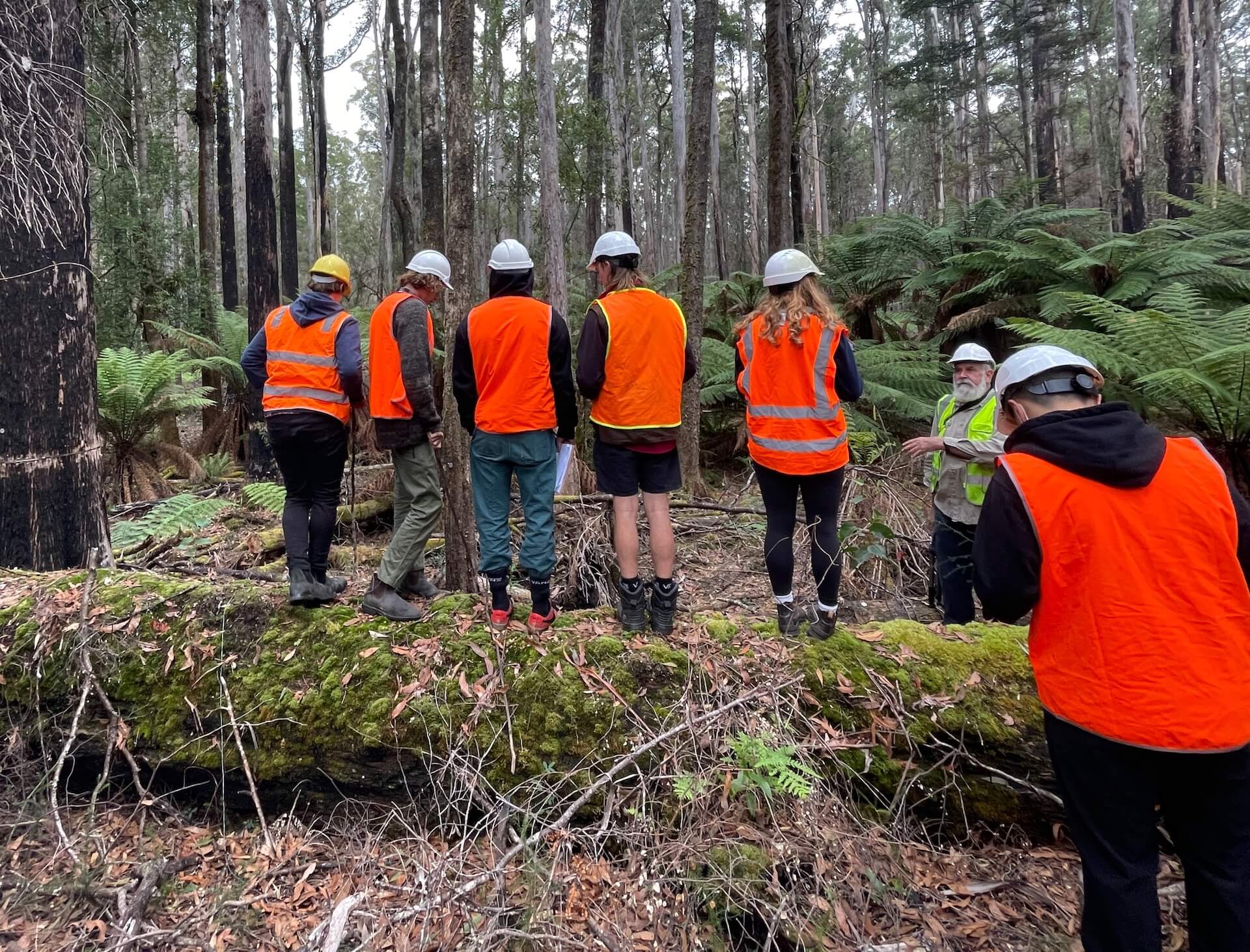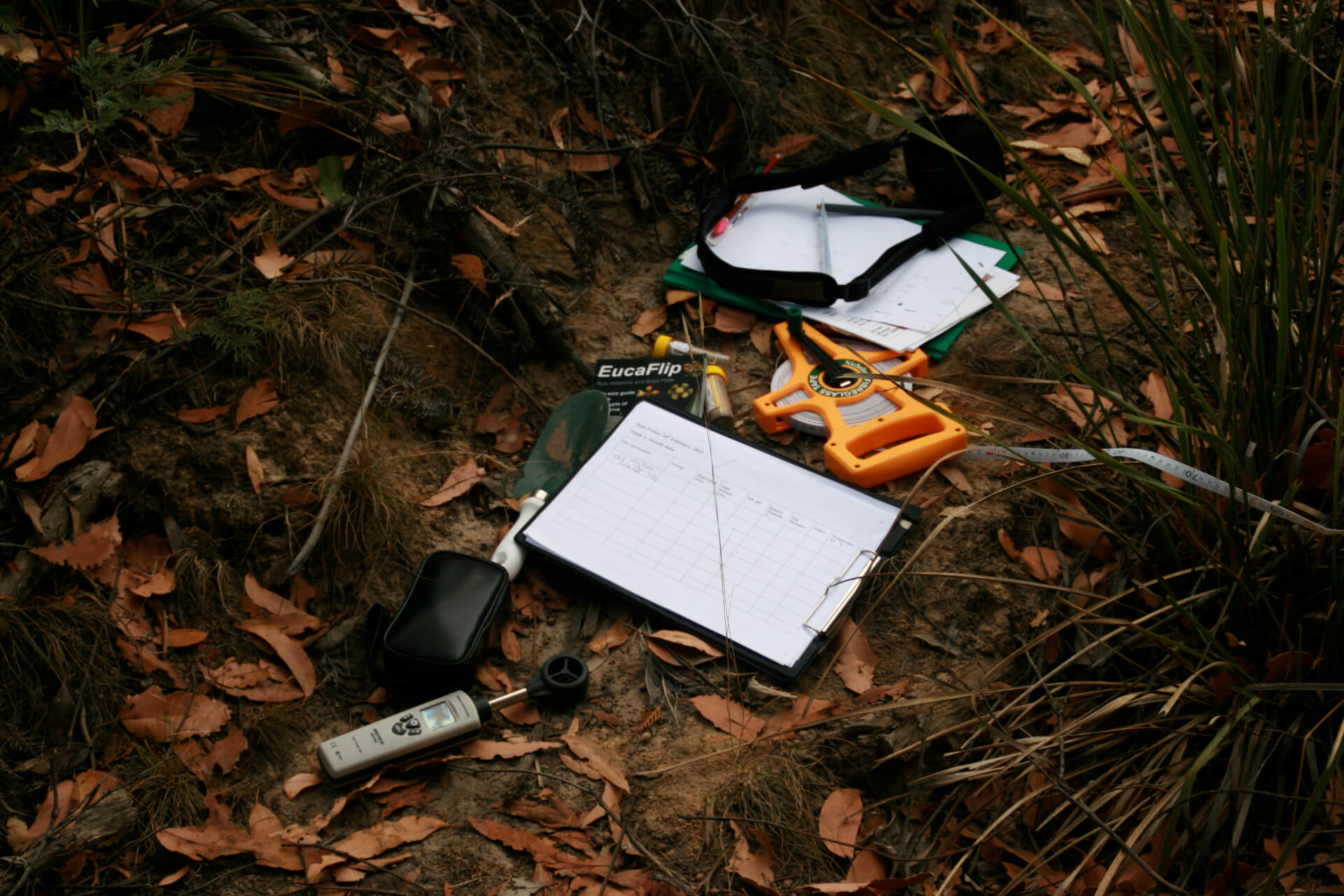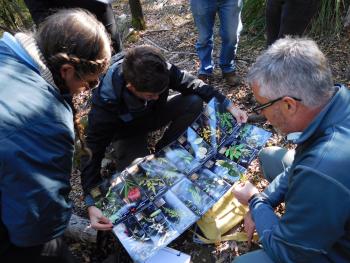
College Programs
Understand a range of sampling techniques that can be applied to terrestrial and aquatic environments. Students learn about the complex nature of ecosystem services that forest communities provide.
Our College programs include options for in-class, field-based and camp experiences for Colleges throughout the State.
Classroom-based programs can include a brief introduction to forest ecosystems, the factors influencing distribution of vegetation communities and characteristics of key Tasmanian forest types. We then explore the regeneration cycles of forest communities, the role and impact of fire in the landscape. From here we are able to discuss the importance of ecosystem services, the social, environmental and economic values we associate with forests and the sustainable use of resources.
Field-based programs include data collection in different forest types. Observe the factors that effect the distribution of forest communities in the Tasmania landscape. Students undertake quadrat and transect sampling, as well as a log decay survey and aquatic invertebrate sampling (subject to location). Opportunities for meeting and working with forest scientist in the field are also possible. Discuss the complexity of assigning ecosystem services to economic, social, or environmental values. How do we manage conflicting services that serve multiple values?
College programs may include investigating:
- Terrestrial and aquatic sampling techniques
- Forest science and research methods
- The importance of random sampling
- Ecosystem services and biodiversity
- People and forests – social, environmental and economic values
- Landscape level management
- Renewable and non-renewable resources
- Forest practices and land use – past, present and future directions
Please contact us for more details about planning your schools experience, to make a booking, discuss the cost structures and our transport subsidy options.

College Programs
Understand a range of sampling techniques that can be applied to terrestrial and aquatic environments. Students learn about the complex nature of ecosystem services that forest communities provide.
Our College programs include options for in-class, field-based and camp experiences for Colleges throughout the State.
Classroom-based programs can include a brief introduction to forest ecosystems, the factors influencing distribution of vegetation communities and characteristics of key Tasmanian forest types. We then explore the regeneration cycles of forest communities, the role and impact of fire in the landscape. From here we are able to discuss the importance of ecosystem services, the social, environmental and economic values we associate with forests and the sustainable use of resources.
Field-based programs include data collection on different forest types, and observing the factors that effect the distribution of forests. Students undertake quadrat and transect sampling, as well as a log decay survey and aquatic invertebrate sampling (subject to location). Opportunities for meeting and working with forest scientist in the field are also possible. The FEF provides a range of specialist equipment to support these activities. We discuss the complexity of assigning ecosystem services to economic, social, or environmental values. How do we manage conflicting services that serve multiple values?
College programs may include investigating:
- Terrestrial and aquatic sampling techniques
- Forest science and research methods
- Mapping and the use of multiple data sets
- The importance of random sampling
- Ecosystem services and biodiversity
- People and forests – social, environmental and economic values
- Landscape level management
- Renewable and non-renewable resources
- Forest practices and land use – past, present and future directions
Please contact us for more details about planning your schools experience, to make a booking, discuss the cost structures and our transport subsidy options.
Curriculum Links
Environmental Science and Society
Criterion 2
Develop, interpret and evaluate experiments and investigations
- Complete transect and quadrat studies to analyse and interpret biotic and abiotic factors
- Conduct a stream survey and use invertebrate species as indicators of stream health
Criterion 5
Demonstrate knowledge and understanding of ecological processes
- Explore the characteristics of Tasmania’s three main forest types: Wet Eucalypt, Dry Eucalypt and Cool Temperate Rainforest
- Understand the influencing factors that contribute to forest type distribution across the landscape
- Construct a food web to identify the flow of energy through the forest ecosystem
- Explore the role of producers, consumers and decomposers
- Follow the cycle of carbon and consider the implication for forest management
- Explore the biotic and abiotic factors that influence producers productivity
Criterion 6
Demonstrate knowledge and understanding of changes to ecosystems, locally and globally
- Understand role of fire in forest landscapes and explore natural regeneration pathways
- Consider importance of biodiversity and the processes that threaten or prevent the loss of biodiversity
Criterion 7
Demonstrate knowledge and understanding of how humans depend and impact on ecosystems
- Explore ecosystem services and the importance of considering the multiple values of forests
- Explore the use of timber, as a renewable resource, and consider future perspectives for innovation in wood products
Criterion 8
Demonstrate knowledge and understanding of principles for the ecologically sustainable management of the environment
- Investigate the complex systems and planning involved in sustainable forest management
- Understand of the importance of forest science and research to land use and management
- What is the purpose of your field trip? We can develop your program to suit your learning objectives and meet your curriculum needs. Please let us know anyway we can adapt the program to suit your students’ interest and learning needs.
- Please notify us about any student with special needs. We can adjust your program to ensure everyone is involved.
- Take advantage of our bus subsidy and fill your bus. Why not take two classes? The FEF has two teachers so taking two groups is not a problem, depending on the program.
- Ensure your students are supervised at all times.
- Prepare for all-weather possibility. Ensure your student have warm clothes, comfy shoes and wet weather gear.
Have fun! The forest is an amazing place. Get involved and enjoy the adventure with your students.
In order to make your excursion planning easier the FEF has developed a Risk Assessment Plan. This document is written by the qualified teachers of the FEF.
For a copy of the risk assessment document click here.


